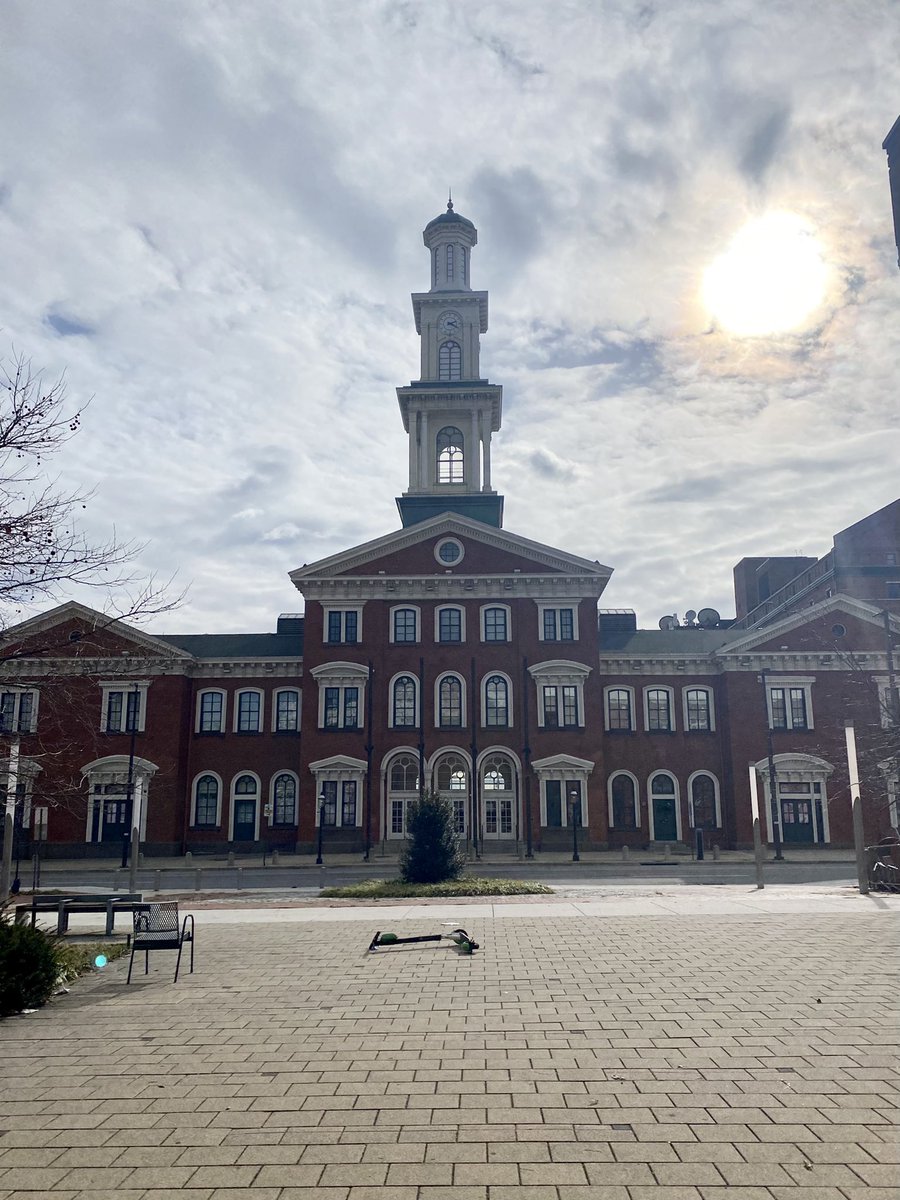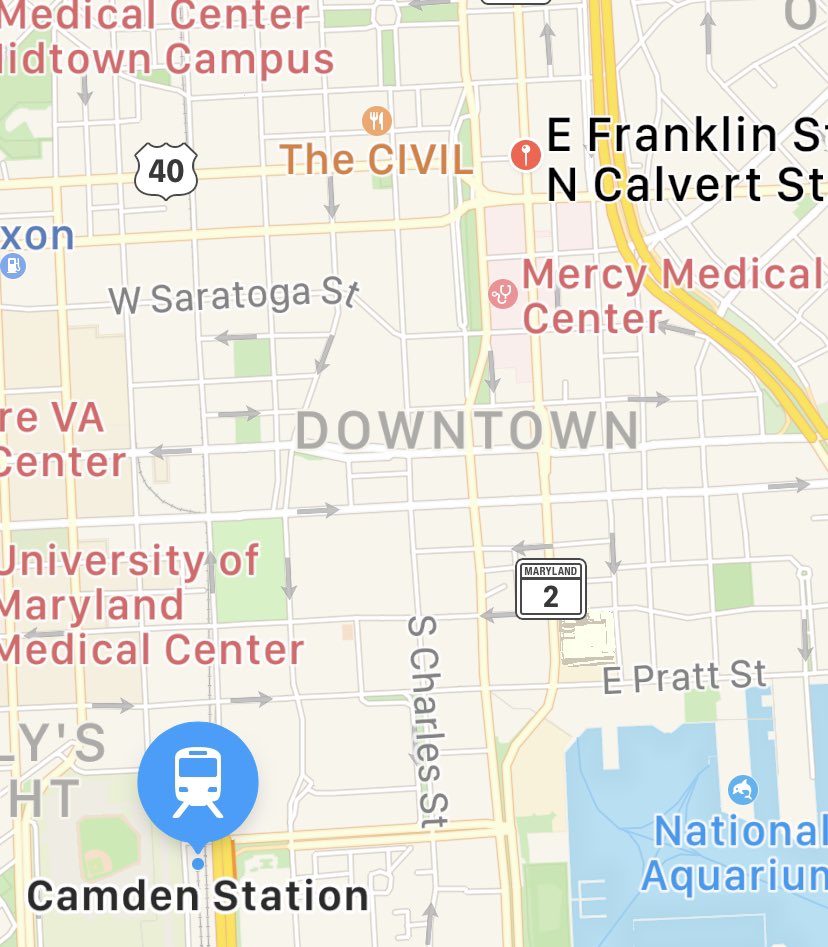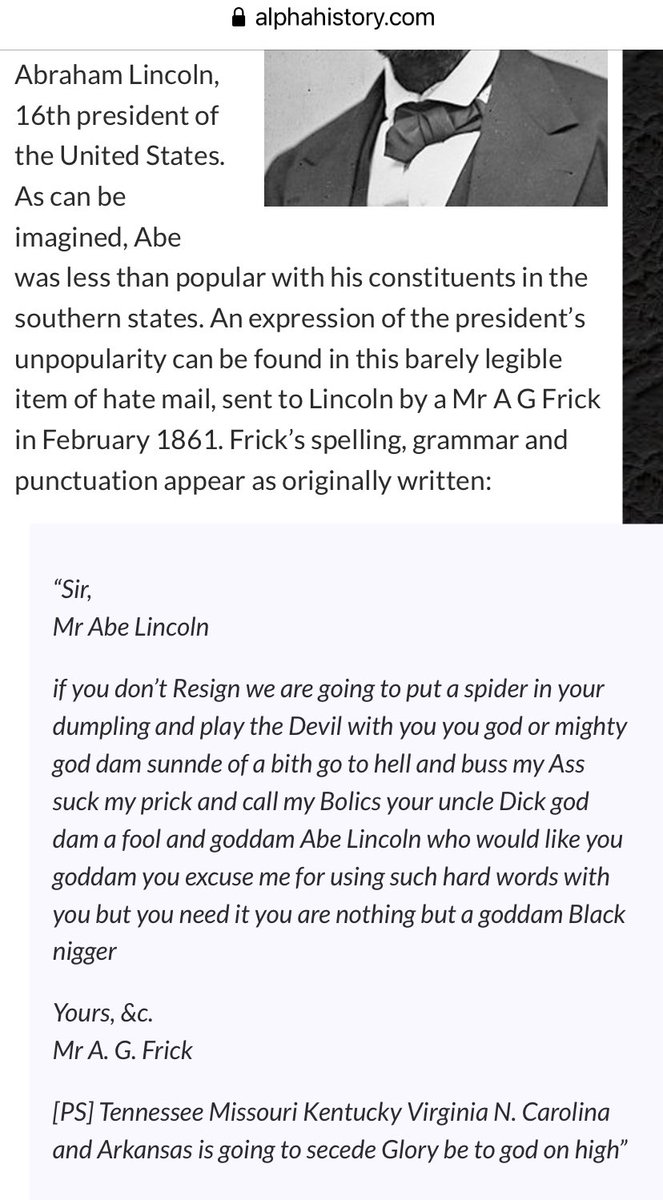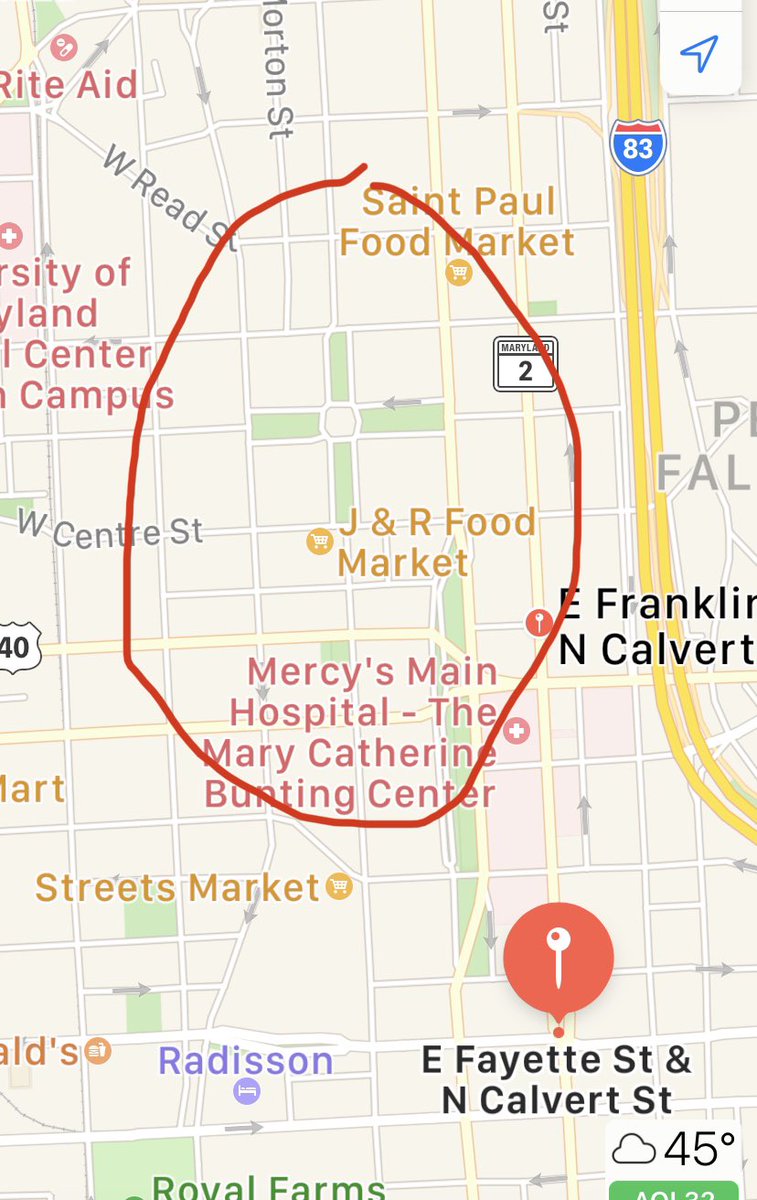Nearly every day I take a walk, grab a coffee, and sit for a while in front of Baltimore’s Camden Station. This is where Abraham Lincoln was nearly assassinated on the eve of his 1861 inauguration. Thinking about that little known story a lot lately, so today, I’m sharing it. 1/
Short bit of context: prior to Lincoln’s election, the was a goddamn disaster. Ideologically divided, hateful, and violent. The President, James Buchanan, has long been considered the worst in American history. I wrote this about him a few years back: https://www.thrillist.com/travel/nation/visiting-wheatland-james-buchanan-lancaster-pa
If you spent even 15 minutes learning about the Buchanan presidency, you could have predicted nearly everything that’s happened in the past few years. As you may have heard, history has a way of repeating itself. But now, to Lincoln! 3/
So after Lincoln won the election, half this country was PISSED. He was going to abolish slavery and whatever whatever ‘MURICA! (Change the policy details, and it’s the same hysteria, generated by the wealthy classes to get the poor to do their bidding) 4/
Try to remember how different the world was back then. News came from the paper; not everyone was literate. Opinions were decided for many by those who controlled information. Some said Lincoln was going to destroy their way of life, and needed to die. 5/
Now Lincoln — the humble lawyer in a tiny little office in Illinois — begins getting bombarded with death threats. He gets so much mail that he needs to hire an assistant to help read it all, who thankfully recorded what was happening, as Lincoln didn’t want to. 6/
“His mail was infested with brutal and vulgar menace, and warnings... But he had himself so sane a mind, and a heart so kindly, even to his enemies, that it was hard for him to believe in political hatred so deadly as to lead to murder.” 7/
Lincoln didn’t want any sort of pageantry surrounding his trip to Washington, and insisted on traveling to his inauguration without military escorts. Meanwhile, whispers that secessionists were planning something huge were growing louder. 8/
The Mason-Dixon Line runs on the northern border of Maryland, meaning that Washington D.C. was firmly in “southern” territory. The secessionists planned to take the Capitol, destroy all points of access to the city, and prevent Lincoln from being inaugurated. 9/
Now a man named Samuel Morse—president of the Philadelphia, Wilmington and Baltimore Railroad—enters the story. He’d heard the rumors, and didn’t think Lincoln or the government were taking them seriously. (They weren’t.) So Morse decided to take matters into his own hands. 10/
Samuel Morse Felton (messed up his name in the last tweet—my bad!) sent for Allan Pinkerton of the legendary Pinkerton Detective Agency. After Felton presented the evidence he had, Pinkerton was convinced. Lincoln was to be assassinated, and it was up to him to stop it. 11/
It was late January. South Carolina, Mississippi, Florida, Alabama and Georgia had seceded, with Louisiana and Texas soon to follow. Maryland’s legislature was considering it. Most of Felton’s railroad was in Maryland, and Baltimore was essential for access to D.C. 12/
I confess I had no idea how important Baltimore was before I moved here. A few blocks from my house are the first railroad tracks to be laid in this country. This city becomes the linchpin of America, and the country’s entire future rests on what happens here. 13/
There was no way Lincoln could get to D.C. without going through Baltimore, so that’s where Pinkerton and his crew of ace detectives headed. He figured if something was going down, that’s where it would happen. His hunch was correct. 14/
He and his agents checked into some nearby boarding houses and started integrating themselves within the city, which at the time was the 4th largest in America with about 200,000 people. It was easy for them to slip around in the shadows, gathering intel. 15/
Baltimore was an odd city. It’s home to some of the oldest free settlements in America: Seton Hill and Sharp-Ledenhall. But Maryland was still a slave state, and Baltimore had plenty. (Notably: Frederick Douglass) This city was as divided as the country was. 16/
Pinkerton goes deep undercover. He becomes “John H. Hutchinson,” a Southern stockbroker who’s new in town and looking to make business contacts. This is genius, bc he can discern people’s politics based on their financial holdings and their interest in certain commodities. 17/
Extremely wealthy people whose pockets are padded with cotton and other southern goods have a lot to lose from a Lincoln presidency. They’re the type to know a LOT more about an insurrection plot than the loudmouths with guns at the local saloon. 18/
Remember: not everyone was literate, and most who were raising the confederate flag didn’t actually have something to lose. They were just told what to do, and who to hate, by the people whose wealth relied on slave labor and the economic health of the south. 19/
Pinkerton and his associates set up fake offices to make themselves look like legitimate, deep-pocketed businessmen who hated the Union and were willing to fund any efforts to crush it. Meanwhile, Lincoln is making plans to travel to Washington to become it’s 16th president. 20/
(Remember: “the Union” is America. These are “patriots” who hated America and sought to destroy it. This is what the Confederate flag has always stood for. Now, back to our story.) 21/
Lincoln announces he will not be intimidated, and is making multiple public@stops on his 2,000 mile to Washington to make himself known. Again, remember this was a time with no tv, no radios. No one knew much about politics or the president. These whistlestops are a BFD. 22/
Traveling from Illinois to Washington, all these stops would happen in the Union. But as we’ve already established, you couldn’t get Washington without Baltimore, making it worse the only slave-holding city Lincoln would travel to. It couldn’t be avoided. 23/
Everyone in the city knows this and is in a tizzy over Lincoln’s arrival. Why, there was a chance that by the time he came through town, Maryland would be part of the confederacy! The powerful became more serious in their plotting. Lincoln would be stopped in Baltimore. 24/
His full itinerary was shared with the press. Lincoln was scheduled to arrive at Calvert Street Station on February 23 at 12:30. He’d then travel to Camden Street Station, where his train to D.C.
Would depart at 3. (Calvert station, where the red pin is, is long gone) 25/
Would depart at 3. (Calvert station, where the red pin is, is long gone) 25/
Meanwhile, the hate mail sent to Lincoln gets more and more intense. Much of it was saved by that assistant I mentioned earlier, and can be found with a bit of Googling. This one threatens him with spider-filled dumplings. 26/
Secret militias begin organizing all over Baltimore. Pinkerton’s crew befriends a regular at a local saloon named Otis K. Hillard, who was a lieutenant in a militia called the Palmetto Guards. (The Palmetto being the symbol of South Carolina’s succession.) 27/
The saloon was in David Barnum’s City Hotel — also long gone, but I’ve pinned its location. Note how close it is to Calvert Station. The area I circled was where all the wealthiest Baltimoreans lived. For many of them, their wealth depended on the existence of slavery. 28/
Hillard spills to Harry Davies —his new best friend and secret Pinkerton agent —that the militias are tracking Lincoln’s movements via telegraph, using a code that successfully avoids detection. It’s a small piece of a much bigger plot, he says, and then clams up. 29/
Meanwhile, Pinkerton is working on gaining the trust of James H. Luckett, a businessman whose offices are next to the agents’ “brokerage firm”. One day while discussing Lincoln’s trip, Luckett slips and says “He may pass through quietly, but I doubt it.” Pinkerton pounces. 30/
Pinkerton whips out $25–about $800 today. He gives it to Luckett and asks him to give it to an organization fighting for “Southern rights.” Luckett takes the money, and is now convinced “John Hutchinson” (aka Pinkerton) is a true believer who deserves to be in on the action. 31/
According to Luckett, a small group of men—a secret society, if you will—were behind a sinister plot to assassinate Lincoln, and he knew their leader: a Corsican immigrant named Cypriano Ferrandini, who was a regular at Barnum’s. He offered to make an introduction. 32/
Pinkerton now had confirmation of the plot, and needed to alert Lincoln somehow. An old acquaintance named Norman Judd was a close advisor to the president-elect, and was traveling with him on his way to Washington. Pinkerton knew he could be trusted, and would listen. 33/
He has the railroad deliver a telegraph directly to Judd: “I have a message of importance for you. Where can it reach you by special Messenger.—Allan Pinkerton” He then goes to meet Luckett, and the leader of what is now known as The Baltimore Plot: Ferrandini. 34/
Ferrandini was different than all the other men Pinkerton and his men had encountered in Baltimore. He spouted the same vitriol and intolerance, but he was well spoken and charismatic, and easily earned the ear—and eventually, respect—of those who listened to him. 35/
“He is a man well calculated for controlling and directing the ardent minded,” Pinkerton wrote in his notes. “Even I myself felt the influence of this man’s strange power, and wrong though I knew him to be, I felt strangely unable to keep my mind balanced against him.” 36/
Ferrandini was charming, capable, and could talk any number of ill-informed Baltimoreans to support whatever he wanted. And what he wanted, he told Pinkerton, was for Lincoln to die. He admitted that an assassination attempt would take place but would not share any details. 37/
It was up to Pinkerton and his team to piece together the clues they had to reveal the greater plot. They knew a large crowd would gather to meet the president, and it was planned that only a small group of police would be present. 38/
Once Lincoln arrived, a disturbance would be created by secessionist militants, which would draw the police away from the president-elect. Then, the assassin would act, shooting Lincoln multiple times before disappearing into the crowd. But who was the assassin? 39/
The Pinkerton crew decided their heavy-drinking friend Hillard might know, and they could get him to talk. Over drinks, he spilled to Davies that his militia unit was to “draw lots to see who would kill Lincoln.” He was hoping he would win. Davies said he wanted in. 40/
That night, Hillard brought Davies to a secret meeting of 20 men to swear an oath to Ferrandini and his “Southern patriots.” The men then cast ballots to see who would be the lucky one to pull the trigger. Davies wrote a full account of the meeting. 41/
There was a chest full of paper slips, one with a red mark. “In order that none should know who drew the fatal ballot, except he who did so, the room was rendered still darker,” Davies wrote, “and everyone was pledged to secrecy as to the color of the ballot he drew.” 42/
Whoever drew the red ballot was to be silent. No one could know who the assassin was until the moment they pulled the trigger, so that the chose person could not be identified, or stopped. Davies was in the room where it happened, but still had no answers. 43/
He walked outside with Hillard, making himself look visibly disappointed so he’d know he’d drawn a white slip. He then worried aloud that whoever the assassin was would chicken out at the last moment. Hilland told him not to worry, because Ferrandini had the same thought. 44/
To make sure that Lincoln would most shot, Ferrandini had not put one red-marked ballot in the box; he had put eight. Yes, there were now EIGHT assassins that needed to be stopped. But Pinkerton had a better plan: what if, instead of stopping them, they avoided them instead? 45/
The plan: get Lincoln to D.C. ahead of schedule. The public would have no knowledge of this, so when the crowds went to Calvert Station on the 23rd, Lincoln would already be safely in Washington. Of course, this was easier said than done. Also, it was incredibly dangerous. 46/

 Read on Twitter
Read on Twitter





